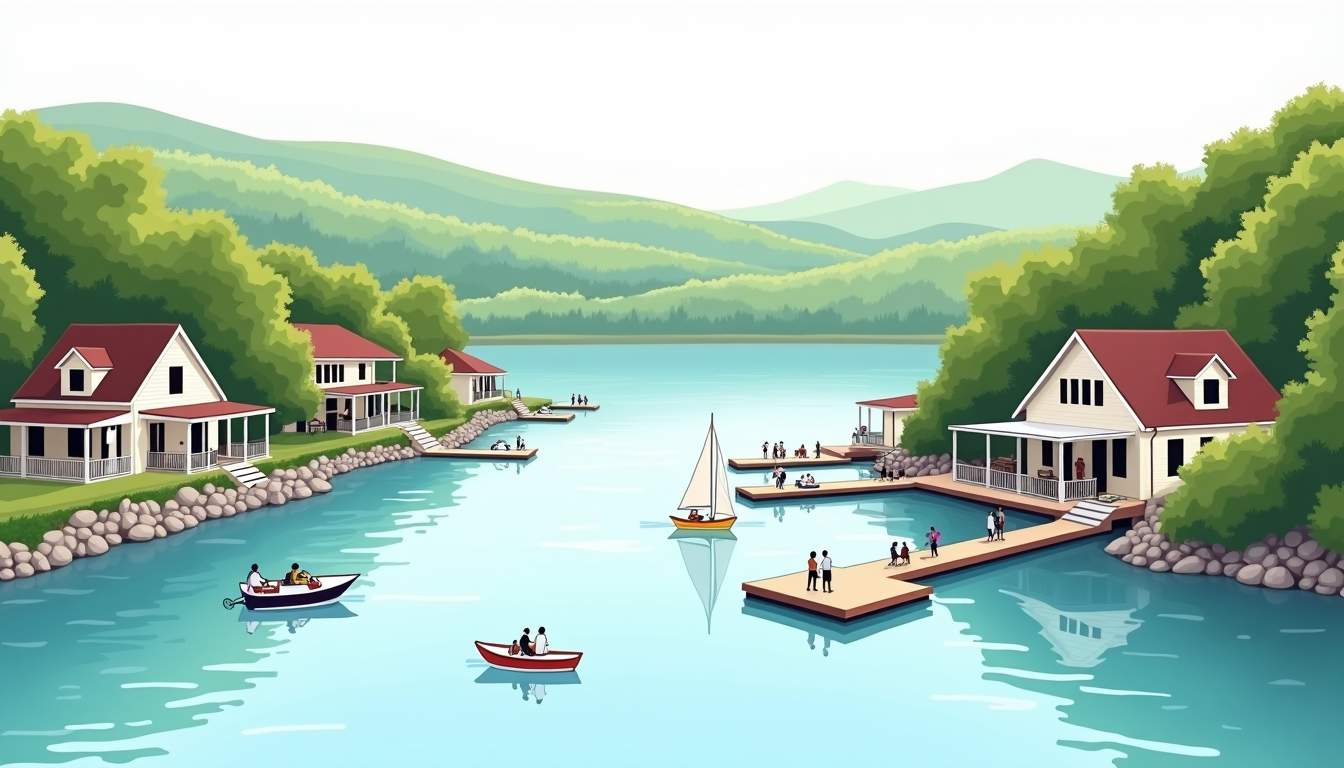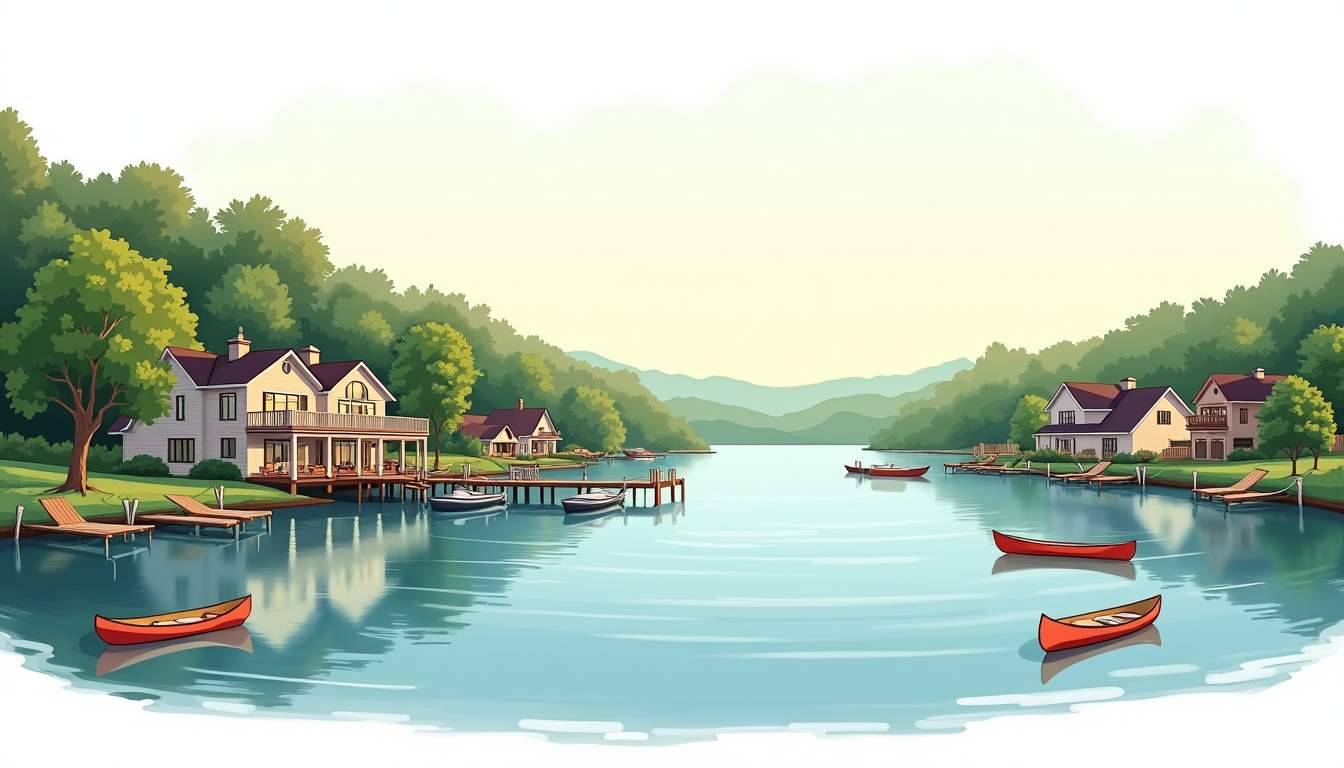
The Tennessee lakeside real estate market offers a unique blend of natural beauty, recreational access, and varied price points that appeal to boat owners and water lovers. From the deep waters of Norris and Douglas Lakes in the east to the wide, winding shoreline of Kentucky Lake and the Tennessee River in the west, finding a boating-friendly property requires understanding local marinas, covenants, flood risk, and seasonal considerations. This guide explores top lakeside areas, the features that matter most to boaters, and practical buying tips to help make a confident purchase.
Tennessee's lakes and rivers create an inviting environment for boating because of the state's temperate climate, accessible waterways, and a well-established culture of outdoor recreation. Many shoreline communities cater specifically to boaters with private docks, community boat ramps, and nearby marinas that provide services such as fuel, storage, and maintenance. For those who value weekend escapes, fishing, or water sports, living on or near the water can significantly enhance lifestyle quality.

Another draw is affordability compared to coastal alternatives. Inland lakes in Tennessee often provide similar recreational opportunities without the hurricane risk and inflated coastal property costs. Additionally, the varied topography means buyers can choose elevated bluff lots with panoramic views or flatter parcels with direct steep or gentle water access depending on preferences and budget.
Properties that suit boat owners usually fall into a few categories: private waterfront homes with individual docks, lakefront condos or townhomes within planned communities offering shared docks, and inland homes with deeded boat slips in nearby marinas. Each type involves different responsibilities and costs — private docks offer convenience and control but require maintenance, while shared facilities reduce personal upkeep but may impose rules and fees.
Tennessee features several standout lakes and river systems that attract boaters. Selecting the right area depends on boating goals — some locations favor fishing and quiet exploration, while others support high-speed boating and social marina life. The following areas consistently rank highly for boating access, shoreline amenities, and property options.
Kentucky Lake, together with Lake Barkley just across the state line, creates one of the largest man-made freshwater recreational systems in the eastern U.S. The lakes provide long stretches of navigable water, numerous marinas, and an abundance of waterfront real estate. Shoreline homes range from modest cabins to large lake estates, and many neighborhoods have private community docks or easy boat launch access. These lakes are particularly well-suited for anglers chasing bass and crappie or for families who enjoy water sports and long cruises.
Closer to Chattanooga and Knoxville, Chickamauga Lake and Fort Loudoun Lake offer excellent proximity to urban amenities while still delivering a peaceful lakeside lifestyle. These lakes are popular for weekend boating, wakeboarding, and small craft exploration. Properties here often come with deep-water access, which is ideal for larger boats, and there are plenty of commercial marinas that offer winter storage and repair services.
For quieter, hillier scenery, the reservoirs in eastern Tennessee — Norris, Cherokee, and Douglas — provide scenic coves and clear waters. These lakes are known for trout and bass fishing, secluded coves for overnight anchoring, and communities with rustic charm. Waterfront lots can include steep bluffs, which provide stunning views but may necessitate specialized dock construction and erosion control measures.
Choosing a lakeside property as a boater means evaluating both on-water and on-land considerations. Prioritizing the right combination of dock access, water depth, protective coves, and regulatory environment can save time and money in the long run.
Dock access is the most immediate concern. Properties with private, covered, or lift-equipped docks are often worth a premium because they make boat ownership simpler and protect vessels from weather and sun exposure. If the property lacks a private dock, check for deeded boat slips, community docks, or nearby marina berths. Also determine who is responsible for dock maintenance and any HOA rules affecting dock use and modifications.
Water depth at the shoreline and out to navigable channels determines what size and type of boat will be practical. Shallow shoals or fluctuating water levels can limit access during dry seasons. Buyers should investigate historical water level data, seasonal fluctuations, and whether the lake is regulated by a Tennessee Valley Authority (TVA) or other body that manages outflow and levels.
Properties in protected coves are preferable for those who plan to anchor or dock frequently. Open, exposed shorelines experience higher wave action and wakes from passing boats, which can impact docking safety and shoreline erosion. Look for properties with natural or man-made breakwaters or coves that are shielded from prevailing winds.
Nearby marinas are valuable for more than just fuel. Winter storage, mechanical repairs, haul-out services, and cleaning are essential for boat owners who want reliable service providers. Proximity to a marina that offers covered storage and professional maintenance can greatly reduce the hassle and cost of owning a boat.
Purchasing a lakeside property requires a combination of standard real estate diligence and water-specific checks. Addressing potential hazards, covenants, and logistical concerns early in the process reduces surprises and ensures the property aligns with long-term boating needs.

Obtain a current property survey that shows waterfront boundaries and any easements. Understanding riparian rights — the legal rights to use water adjacent to the property — is critical. Some properties include exclusive rights to build and maintain a dock, while others grant only limited access. Confirming these rights in writing prevents disputes with neighbors or the managing authority.
Examine the shoreline for erosion issues, vegetation stability, and the presence of seawalls or riprap. Erosion can be costly to remedy and may limit dock placement options. A geotechnical assessment or consultation with a shoreline contractor can reveal necessary stabilization measures and associated costs.
Review homeowners association rules, covenants, and county regulations related to dock construction, boat size limits, and lake use. Some communities restrict certain watercraft, noise levels, or dock modifications. Local permitting processes for docks and shoreline work may require time and additional expense, so factor those into planning.
Waterfront properties carry flood risk even on managed reservoirs. Order a floodplain determination and consider elevation certificates if applicable. Flood and wind insurance premiums can add substantial ongoing costs, so get insurance quotes before finalizing an offer. In some cases, elevating structures or reinforcing foundations is advisable to mitigate insurance costs and risk.
Financing a lakeside property and planning for ongoing maintenance are important parts of the ownership picture. Lenders may have additional requirements for waterfront homes, and maintenance budgets should account for dock upkeep, shoreline management, and seasonal boat care.

Not all lenders treat waterfront properties the same; some may require higher down payments or specific appraisals to account for unique risks. Conventional loans are available, but buyers should be prepared to provide more detailed information about the property, including surveys and proof of dock rights. Working with mortgage brokers or lenders experienced in waterfront transactions helps smooth the process.
Maintenance includes dock preservation (staining, hardware replacement, flotation checks), shoreline erosion control, septic and well system care for rural homes, and landscaping that prevents runoff into the lake. Budgeting 1–3% of the property value annually for general upkeep is a reasonable starting point, with higher allowances for older docks or properties with complex shoreline stabilization needs.
Seasonal considerations vary by region and lake. Many boat owners use dry stack storage, covered slips, or haul-out services in winter. Winterizing engines, fuels, and plumbing is essential to prevent freeze damage and reduce long-term maintenance costs. Confirm availability and cost of storage options at local marinas before purchasing.
When ready to make an offer, include contingencies that reflect waterfront-specific concerns: satisfactory survey results, confirmation of dock rights, shore condition approval, and appraisal for a waterfront property. A clear timeline for inspections and permitting research keeps the transaction efficient and reduces the risk of post-closing surprises.
Working with a real estate agent experienced in Tennessee waterfront properties provides significant advantages. Such agents are familiar with local marinas, typical shoreline issues, and the permitting landscape. They can recommend inspectors, boatyard contacts, and contractors who specialize in docks and shoreline work, streamlining due diligence and helping negotiate repairs or credits based on inspection findings.
Owning a boating-friendly property in Tennessee can deliver years of recreation and relaxation, but it requires thoughtful planning. Balance the desire for immediate waterfront access and convenience with considerations about maintenance, insurance, and regulatory constraints. With careful research and the right local team, waterfront ownership in Tennessee can be both a wise investment and a deeply satisfying lifestyle choice.
Whether pursuing a small weekend retreat with a deeded slip or investing in a full-time lakeside residence with a private dock, the keys to success are understanding water access rights, evaluating shoreline conditions, and preparing for the ongoing costs of boat ownership. With those factors in place, Tennessee's lakes offer exceptional opportunities for boating enjoyment and lakeside living.
Embrace the ultimate lakeside lifestyle at Tennessee National, a premier gated community offering luxury waterfront living combined with exclusive boating amenities. From a private marina to scenic nature trails and vibrant social clubs, our community is designed to enhance your passion for boating and outdoor recreation. Whether you're seeking a move-in ready home or a custom build, experience resort-style living tailored to your needs. Schedule a private tour today and start making unforgettable memories on Tennessee’s beautiful waters.